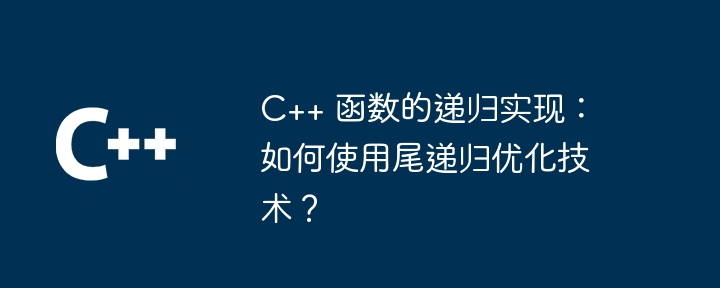Home >Backend Development >C++ >Recursive implementation of C++ functions: How to use tail recursion optimization techniques?
Recursive implementation of C++ functions: How to use tail recursion optimization techniques?
- PHPzOriginal
- 2024-04-22 16:03:02422browse
The efficiency problem of recursive functions can be solved through tail recursive optimization (TCO) technology. Although the C compiler does not support TCO, it is possible to simulate this behavior through the [__tail_recursive](https://en.cppreference.com/w/cpp/keyword/tail_recursive) keyword, converting recursive calls into iterations. TCO applies when a recursive call is the last operation of a function. It is implemented by using tuples to return new state values and tail-recursive call indicators, eliminating the overhead of stack frame creation and improving efficiency.

Recursive Implementation of C Functions: A Practical Guide to Using Tail Recursion Optimization Techniques
Recursion is a function that calls itself A process that is useful when solving certain types of problems, such as traversing a data structure or finding a solution. However, recursion can reduce program efficiency by creating many function call stacks, which is especially concerning when working with large data sets.
Tail Recursion Optimization
Tail Recursion Optimization (TCO) is a compiler technique that converts recursion into a function when it has a recursive call as its last operation. Calls are converted into iterations, eliminating the overhead of stack frame creation. This is important for functions with a lot of recursive calls.
Implementing TCO in C
C compilers usually do not support TCO, but we can use [__tail_recursion](https: //en.cppreference.com/w/cpp/keyword/tail_recursive) keyword simulates this behavior:
#include <utility>
template <typename F, typename T, typename... Args>
std::pair<bool, T> tail_recursive(F&& f, T&& x, Args&&... args) {
while (true) {
const bool is_tail_call = false;
const auto result = f(std::forward<T>(x), std::forward<Args>(args)...);
if constexpr (!is_tail_call) {
return result;
}
x = std::move(std::get<0>(result));
f = std::move(std::get<1>(result));
}
}tail_recursive The function receives a function object f, initial state x and additional parameters args. It returns a tuple where the first element indicates whether to make a tail-recursive call and the second element is the new state value. If the current call is not a tail-recursive call, the result is returned; otherwise, a recursive call is made with the new state value and updated function call.
Practical case
Consider the following recursive function for calculating factorial:
int factorial(int n) {
if (n == 0) {
return 1;
}
return n * factorial(n - 1);
}Use TCO to convert it to tail recursion:
auto factorial_tail_recursive(int n) {
auto f = [&](int x, int y) -> std::pair<bool, int> {
if (x == 0) {
return {false, y};
}
return {true, y * x};
};
return tail_recursive(f, 1, n);
} In this tail-recursive version, the inner function f returns a tuple in which the first element indicates whether to make a tail-recursive call and the second element is the new state value. Each time f is called, it updates the state y and returns a boolean indicating whether to make a tail-recursive call.
Note: TCO is not applicable to all recursive functions. It can be used only when the recursive call is the last operation of the function.
The above is the detailed content of Recursive implementation of C++ functions: How to use tail recursion optimization techniques?. For more information, please follow other related articles on the PHP Chinese website!

